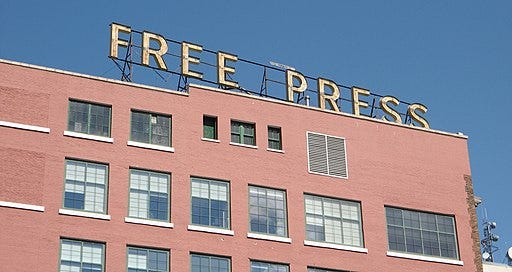The (self-)importance of a free press
Journalists have a vital role to play in speaking truth to power. But they must be willing to listen when power speaks truth back to them.
Earlier this year, the journalist Isabel Oakeshott caused consternation when she published a number of texts shown to her by former Health Secretary, Matt Hancock, under protection of a non-disclosure agreement. When fellow journalists were asked if they condemned Oakeshott’s breach of confidentiality, many declined to do so.
Spectator Editor, Fraser Nelson, wanted even more of the texts disclosed, telling the BBC’s Laura Kuenssberg (much to her surprise): “Ethically, there’s no real contest here.” Questioned whether it is in the public interest to breach a non-disclosure agreement, he said: “It’s in the public interest that journalists do their job.”1 That last comment rather begs the question of what really is the job of a journalist.
The question arose in my mind once again at the start of the week when Times journalist, Sean O’Neill, took the Attorney General to task for daring to remind the press to respect the law of contempt when reporting investigations into Russell Brand. That was “a shocking overreach” so far as O’Neill was concerned, “a government threat to curb investigative journalism”.
Wow! Let’s be clear. The Attorney General had not attempted to sanction any publication or even suggested that the reporting had yet reached the point where sanctions might be called for. She merely reminded the press, in general, to “take legal advice to ensure they are in a position to fully comply with the [law].” And, as O’Neill pointed out in his polemic:
Anyone with even the sketchiest knowledge of how the media works surely knows that every single word of reporting on Brand has been rigorously scrutinised before publication. And one of the many things looked at is whether there is a contempt issue.
So which is it? Does O’Neill think the AG is trying to prevent journalists from doing their job or is she simply reminding them to do something that O’Neill assures us they would all be doing anyway?
O’Neill’s confusion didn’t stop there. He told us:
It is not [the Attorney General’s] job to tell reporters to stop reporting on issues where there is merely the “potential” for criminal proceedings.
And that:
As a journalist for more than 35 years, I have always understood that contempt of court “bites” when proceedings are active (ie there has been a summons, an arrest or a charge).
Well, his understanding is wrong. I don’t know how much investigation O’Neill does before writing an article (did he take legal advice on this one?), but I looked up contempt as part of my own research for this piece and I quickly found the error in what he wrote. O’Neill was clearly referring to one part of the law which comes into effect only when proceedings are active. But he was overlooking entirely another area of contempt (common law contempt) which goes wider.
A free press is vital to a democracy. You only have to observe accounts of the way the war in Ukraine is reported by journalists in Russia to appreciate how essential a free press is. I would not want to take issue with O’Neill when he says:
It is the job of reporters to uncover misconduct and wrongdoing, to gather evidence that could lead to criminal trials.
But, as Jonathan Caplan KC put it, ever so beautifully, in a letter to the Times:
The media may be the investigatory watchdog but it cannot then be judge and jury.




